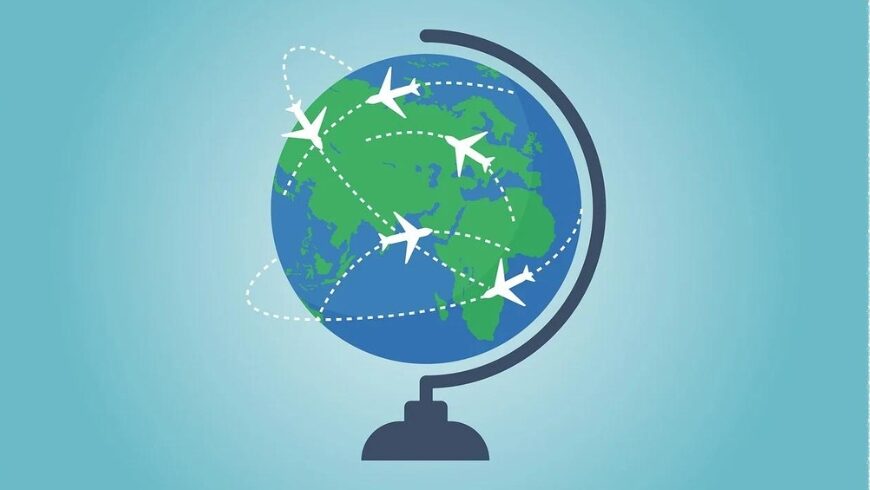Tourism is an activity that is in constant progress and travelers are on the move, it contributes enormously to the economic strengthening of countries and there are more and more people who move from one place to another for various reasons and in various ways. This activity allows the economic growth of different places in the world but we must not lose sight of the fact that beyond economics, sustainability is currently one of the great challenges to face for the development of tourism on different scales (global, regional, local).
Sustainability must be considered a priority for companies and governments, but also for those who travel the world as tourists.
Globalization and its influence on tourism

The globalization phenomenon and the technological revolution that the world is going through today allow the movement of products, information, money and also people to increase at great speed. These phenomena have changed the way of seeing tourism and the possibilities of doing it. Many places that were not previously visited by tourists today receive more and more people, and the world’s classic tourist destinations are congested by the constantly growing tourist demand.
The variety of accommodation at different prices, the availability of different types of lodging, the variety of means of transportation to get from one place to another, and the ease-flexibility that many find to carry out their jobs, are factors that allow Human beings move more and more frequently and for different reasons .
There are those who do it for work, leisure, relaxation, study, among others. But they all have one thing in common: visiting new and diverse places, knowing that they are temporarily there.
Millions of tourists leaving millions of footprints
Many times when people visit a place temporarily, they behave in a different way than when they are in their city of residence since they are simply “passing through”. It is this issue that the tourist must re-think and improve to achieve positive advances in sustainable tourism. Every corner of the world must be preserved and inhabited responsibly, regardless of the time we decide to be there, we must not forget that the environment works as an interconnected system where its components interact and it is necessary to maintain a balance to maintain sustainability over time.
As we move around the world, we leave our ecological footprint, so it is important to take into account the way in which we do it.

Tips to keep in mind when traveling
Before traveling:
- Research previously about the culture and way of life of the place to visit to respect its social values
- Organize an environment-friendly itinerary
- Consider public transport, cycling or simply walking to move within the city
- Rent electric vehicles in case you need it
- Analyze the sustainability policies and the principles of social responsibility carried out by the accommodation that you want to rent
While the trip is going on:
- Being in contact with the local community, appreciating the culture, and consuming local products
- Be informed and respect the separation of waste that is carried out
- Take care of public areas and be responsible for our waste
- Be responsible with the consumption of light and water beyond not being the ones who will pay for that consumption at the end of the month
- Share with the people we meet on the trip our daily practices that are friendly to the environment
- Avoid printing tickets and bills that can be downloaded on digital devices
After the trip:
- Share the experience with other travelers to make it known that a more responsible way of moving around the world is possible.
The role of big institutions
Tourism as an economic activity requires regulation and control by the State so that the activity can be developed while preserving the space, its resources, and the society that inhabits it. It is essential that at this time of tourism growth and expansion, governments, big companies, and different institutions assume the commitment to raise awareness and be strict in this transformation process to achieve sustainable and balanced tourism, since tourism as an economic activity It can generate great wealth but it can also become a big problem if a regulation is not generated that allows minimizing the negative impacts. about the environment.
It is the large institutions that must territorially organize tourist destinations to generate the optimal conditions for the development of the said activity.
Travelers, natural resources, and biodiversity
It is of vital importance to be responsible and conscious in the use of natural resources and biodiversity of the place that you choose to visit to avoid over-exploitation and depletion of them. Energy, water, and natural resources in general demand to be used rationally and consciously.
In general, there is a significant growth in the world population but also each tourist destination experiences high increases in the number of visitors, which can be attractive in economic terms, but the preservation of resources and their responsible use must be an issue priority for tourism companies, governments and travelers themselves.
Here it is important to mention the relevance of “sustainable development” for a transforming future , since this path of development proposes to satisfy current needs without harming ecosystems, preserving resources responsibly with future generations in mind.
New interests are born in travelers

Environmental education is occupying an increasingly important place and is expanding in various educational and labor fields. It is also the environmental problems faced by today’s society that generate new interests and greater concern for caring for the environment, they are more aware of the impact of their trips. Therefore, more and more people are planning their itineraries thinking like “responsible tourists”. There is a new profile of the traveler who seeks to enjoy the experience while reducing his ecological impact in the place he visits.
People easily and quickly access information about the place to visit and take into account various environmental and social factors beyond the classic aspects that are evaluated when choosing a destination.
The world we live in demands a global social change that, if carried out with responsibility and commitment, will result in the most successful tourist destinations in the future being those that have worked hard to preserve the environment and its resources, providing quality experiences that then travelers share with the community.
Sustainability will be the main value that highlights a tourist destination and will therefore provide it with greater competitiveness.




